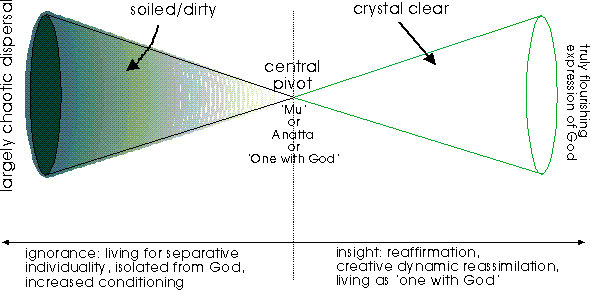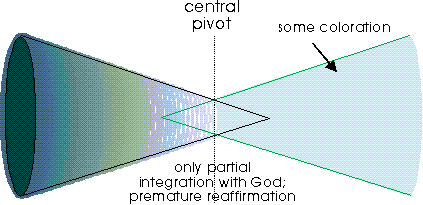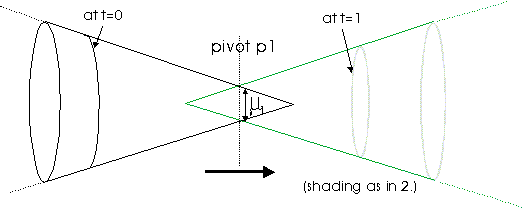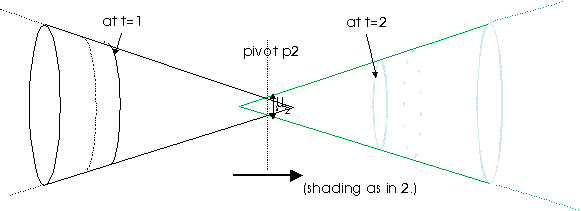
Recall that there I defined 'spiritual truth and reality' as 'that which is eternal' and asserted that knowledge of this is the way to God. In the last chapter I attempted to express essential qualities of God, thereby indicating the sort of experience required for knowledge of God. To provide further clues on acquiring the appropriate focus, I've tried to stress the need for a non-dualistic view by highlighting how seriously a dualistic view can taint a conception of a personal relationship with God.
I proceed now to offer more ideas on the essential qualities of the eternal.
'A monk asked Joshu, "All things come back to one. Where does the one return to?" Joshu said, "When I was in the province of Sei, I made a robe, It weighed seven kin."' [Hekigan-roku, 45]
Mere intellectual juggling is hopeless; the questioner, posing as absurdly abstract teaser, was jolted unceremoniously into seeking active experiential proof (which was probably being given!), experience which makes nonsense of mere words, words to which one clings only in foolishness.
There is plenty of evidence as to a more straightforward presentation of the appropriate answer: just look at how Christ exalted all the wonderfully varied qualities of each person; in being one with God, he was able to affirm fully and appropriately the signs of God in each and every one. In this way Christ, free of ignorance, displayed insight in reaffirmation.
We may try to affirm the signs of God in the manner of Jesus when we are only partially one with God, but this is likely to produce inappropriate affirmation from the part of us which is away from God. The dangers of this are not to be underestimated.
The principle goal then is to strive whole-heartedly for oneness with God, whilst proceeding warily and dutifully in normal daily life. I encapsulate and elaborate on these ideas in the three diagrams below.
1. The ideal path to Enlightenment ('The Way')

Suppose that our (mental) view of the totality of existence (and non-existence) is represented by one of any of the circumferences of a circular section of the left hand cone. As we move rightwards towards the pivotal point of being one with God, the totality of existence is brought together (unified); this is shown by the glass becoming clearer. Conversely, as we move leftwards, we move further away from God as our view falls apart; and the glass becomes more opaque.
The Way leads us ever rightwards to union with God and beyond. Once we've crossed the pivotal point, a glorious reassimilation begins with a perfectly clear mind; and the glass remains forever clear as one proceeds as far as one likes (possibly forever), expressing God in an increasingly flourishing manner.
2. A partial enlightenment
The picture is as above except as indicated.

Here, someone sets out as in (1.), i.e. moves rightwards along the left hand cone, towards unity with God. However, before oneness is achieved, the mind's view expands to reaffirm. Some creativity follows but so does inevitably reactivity as this is only a partial enlightenment; the right cone is tinged throughout however far one proceeds to diversify.
Such an illustration is, I feel, representative of a certain duration - from split-seconds to years - in a typical person. Our lives, through time may then be mapped as in the following sequence.
3. A spiritual path which goes to and fro
[All movement is rightwards.]
t=0 (step 1)

(step 2) At t=1, reflect in pivot p1, back to any circumference left of p1 in the left cone ...
t=1 (step 1)

Keep repeating steps (1) and (2) for t=2,3, ... This represents the toing and froing between introversion and extroversion. Note that u1, u2, ... is not usually a monotonic decreasing sequence; in other words, our spiritual path goes to and fro in an irregular manner. However, if we continue to persist, then one day we shall proceed right through the central pivot of God.
The 'contemplative' is likely to spend a lot of time in the left cone; all being well, when he or she proceeds through to the right cone, that person will be close to God, but this is not necessarily the case. The 'missionary' is likely to spend a lot of time in the right cone; such a person can certainly be dynamic, though is likely to be conditioned (somewhat away from God) through insufficient insight gained in the left cone; but that is not necessarily the case.
There is indeed a problem to find the appropriate balance! However, until one is acting in unity with God, then (I feel) the tendency must always be to activity in the left cone.
The Western world has during at least the past couple of centuries lived largely by clock time. Its fixed units, spread indiscriminately ad infinitum, provides structure at the expense of creativity and the authenticity of experience; in current Western society, people's enjoyment is often reduced to predefined slots of x minutes in activity y. To my mind, just as 'mass' has perhaps been overrated as a measure of material reality, then so has 'clock time' been overrated as a measure of mental reality.
To measure experience much more effectively, one may speak about organic time - time which has an elastic property whose 'length' (magnitude) is directly proportional to the quality of experience; now, one relates entirely to experience and not to irrelevant dates. An extremely powerful experience has thus more weight in organic time than clock time, and any recollection is likely to invoke experiential echoes of it to the present instant. In the East, there has been more emphasis on organic time: observe the Thai language where the past and future tenses differ from the present tense only by virtue of having the odd word tagged on.
We have it that God somehow transcends (and hence vilifies) clock time, yet shares in every aspect of the universe, including this crutch of man. This is, as I hinted above, on the same wavelength as the notion of anatta; just as nothing is fixed or unchanging, then there is in fact no such thing as a point in time: for how long is it exactly 6p.m., say? How long exactly did you spend eating your last meal? In actuality, you cannot measure any duration perfectly accurately in clock time: you can only approximate.
What is needed (again) is close attention to experience, and to measure its 'duration' we use organic time. Hence to chart Christ's death and resurrection as historic episodes in clock time, is a misrepresentation of its importance; the experience in organic time of what Christ went through is surely the significance.
Henceforth let us cease to be 'creatures of (clock) time' and instead live more spontaneously in organic time!
A more direct transcendence may be inferred from the following very intuitive conjecture.
Such a post-life expectation reveals ignorance as to one's purpose during life which I see is to strive to be 'in Heaven' on Earth, in one's conscious existence before death. We are otherwise 'in Purgatory' now!
And what does it mean to be 'in Heaven'? For me, this is equivalent to being one with God. Recall again that Jesus said, "Mine is not a kingdom of this world." Hence, one must be very careful when talking about the 'pleasures' of Heaven, say, not to conjure up false images and expectations of total sense gratification, conditioned by our human existence.
Note that by the Law of Conditionality, we (or, rather, that conditioned aspect with which we identify) are guaranteed eternal existence. Also this law implies that we have already existed for eternity: the notion that our eternal existence has only begun from conception in our mother's womb (in one direction, as it were) is like saying that just because you see a tiny spring spurt out of the ground then you may deduce that the ground has just been the source of the water...
So we have eternal existence, but going around in the wheel of Samsara - as the Buddhists put it - is not living; we must instead be spiritually active and the pursuance of this will lead us to Eternal Life, whose purest form is living one with God.